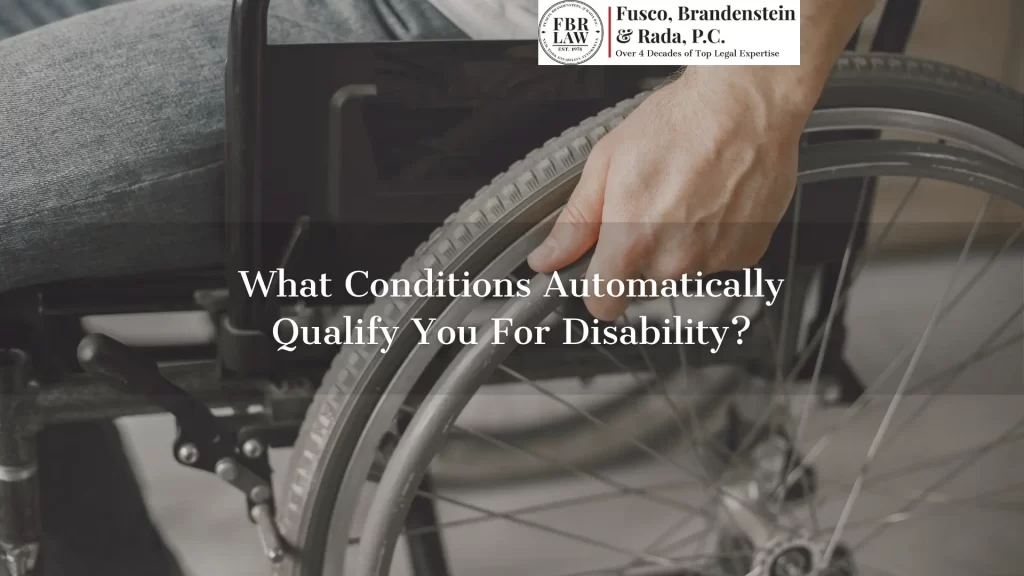
A range of injuries, illnesses, and other medical conditions could qualify you for Social Security disability benefits. However, there’s no such thing as an automatic qualification.
What Is Social Security Disability Insurance (SSDI)?
Social Security Disability Insurance (SSDI) is a federally funded program administered by the Social Security Administration (SSA). It is designed to provide financial assistance to individuals who are unable to work due to a long-term disability. Eligibility for SSDI benefits is based on a person’s work history and the amount of Social Security taxes they have paid into the system.
People ask, “What conditions automatically qualify you for disability?” The answer is none. To qualify, an individual must have a medical condition that is expected to last at least one year or result in death, and it must prevent them from engaging in substantial gainful activity. The amount of the monthly benefit is determined by the beneficiary’s earnings record. SSDI not only supports the disabled individual but, in certain circumstances, can also provide benefits to their dependents. It is distinct from Supplemental Security Income (SSI), which is a needs-based program for disabled individuals with limited income and resources.
What Is a Disability?
According to the Social Security Administration (SSA), a person has a disability if they:
- Have a medical condition preventing them from working and engaging in substantial gainful activity
- Don’t have the ability to work at the job they had before they became disabled or adjust to another type of work
- Have the condition for at least one year or expect it to last for at least one year or result in death
The SSA considers the following five factors when determining whether an injured or sick worker has a disability that entitles them to benefits:
- Whether the employee still works and earns average monthly wages exceeding $1,470 (or $2,460 for blind individuals)
- Whether the disability significantly limits the worker’s ability to perform basic tasks at work, such as sitting, lifting, standing, or walking
- Whether the condition is on the SSA’s list of qualifying medical conditions
- Whether the worker can perform their previous job due to the disability
- Whether the employee can find another job based on their age, education, experience, skills, and medical conditions
Conditions Eligible for Disability Benefits
There are no conditions that “automatically” qualify for Social Security Disability benefits based solely on the diagnosis of a condition. The SSA uses a guide it calls the “Blue Book” to determine eligibility. The Blue Book lists several impairments severe enough that individuals afflicted with them are presumed disabled. However, simply having a condition that’s in the Blue Book doesn’t guarantee benefits.
To be approved for SSDI benefits, you must meet the specific criteria outlined for a given condition in the Blue Book. And even if your condition isn’t in the Blue Book or you don’t meet the exact criteria, you could still qualify. When applying for disability benefits, you must demonstrate that your impairments prevent you from working.
Below are some common disabling conditions listed in the Blue Book.
Musculoskeletal Disorders
Musculoskeletal disorders affect the musculoskeletal system and connective tissues. Common types of musculoskeletal conditions include:
- Back pain: An injury to the spine, muscles, tissue, discs, or spinal cord can cause significant pain and a range of other symptoms. It can impair the ability to perform various job-related tasks.
- Rheumatoid arthritis: Rheumatoid arthritis is an immune system disorder that can lead to pain, joint stiffness, fatigue, and weakness. It can severely affect a person’s physical functioning.
- Fibromyalgia: Fibromyalgia is a disorder that causes widespread pain in the musculoskeletal system. Symptoms commonly include memory issues, fatigue, and dull aching pain.
Mental Disorders
Although mental disorders might not seem disruptive to a person’s physical job-related abilities, they can cause debilitating symptoms. Mental illnesses that qualify for SSD benefits include:
- Schizophrenia and other psychotic disorders – Schizophrenia causes behavior that can impair daily functioning. Symptoms can include delusions, disordered thinking, and hallucinations.
- Post-traumatic stress disorder – PTSD is a mental health condition triggered by a traumatic event. Severe anxiety, flashbacks, and nightmares are common with this type of mental disorder.
- Mood disorders – Depression and anxiety are among the most common mood disorders. They can severely limit a person’s cognitive function and cause debilitating physical symptoms.
Cardiovascular Conditions
The cardiovascular system consists of capillaries, veins, and the heart. Different conditions can affect the cardiovascular system, such as:
- Coronary artery disease – The coronary arteries narrow from plaque build-up when someone has coronary artery disease. This decreases the amount of blood and oxygen the heart receives.
- Angina – Angina is a condition that causes severe chest pain. It can also radiate to the arms, neck, and shoulders. The pain results from a decrease in blood flow to the heart.
- Hypertension – Hypertension or high blood pressure can cause severe damage and lead to stroke, heart disease, or other cardiovascular problems.
Cancer
Different types of cancer are eligible for SSD benefits depending on multiple factors. The most common cancers involved in disability claims include:
- Lymphoma
- Multiple myeloma
- Skin cancer
- Leukemia
- Breast cancer
- Sarcoma of the skeletal system
- Cancers of the neck and head
- Thyroid cancer
- Soft tissue sarcoma
- Lung cancer
- Intestinal cancer
- Stomach or esophageal cancer
- Pancreatic cancer
- Testicular cancer
- Malignant melanoma
- Liver cancer
Neurological Disorders
 Neurological disorders affect the brain and nerves around the body and spinal cord. Common neurological conditions limiting a person’s abilities at work include:
Neurological disorders affect the brain and nerves around the body and spinal cord. Common neurological conditions limiting a person’s abilities at work include:
- Multiple sclerosis – Multiple sclerosis (MS) is a central nervous system disease. In MS patients, the immune system attacks the myelin, the protective covering around nerve fibers.
- Traumatic brain injury – A traumatic brain injury can result from a violent jolt or blow to the head or neck or a penetrating injury. Dizziness, headaches, and fatigue are common symptoms.
- Muscular dystrophy – Muscular dystrophy is a group of diseases that cause a loss of muscle mass and progressive weakness. It can lead to frequent falls that cause additional medical issues.
What If My Social Security Disability Case Gets Denied?
Receiving a denial letter for your SSDI claim can feel disheartening, but remember that you still have options and resources available. By its own metrics, the SSA rejects a significant percentage of initial SSDI claims. These denials often stem from incomplete documentation, lack of evidence, or other administrative issues.
If your claim gets denied, a skilled SSDI lawyer can help. Your attorney can guide you through the appeals process, preparing all necessary paperwork and presenting the strongest case possible on your behalf. They can also gather essential medical evidence, work with doctors to understand your medical condition, and represent you during hearings. With the support of a knowledgeable lawyer, your chances of overturning a denial and securing the benefits you deserve increase significantly.
Contact Us
In conclusion, while there are no conditions that ‘automatically’ qualify for disability based solely on the diagnosis of a condition, you can still be eligible for benefits if you demonstrate that your impairments prevent you from working.
If you have suffered an injury or illness that prevents you from earning your usual wages, contact Fusco, Brandenstein & Rada, P.C. today. You might qualify for disability benefits if you can’t return to your job or earn the same income you made before your diagnosis.
Call Fusco, Brandenstein & Rada, P.C. at 516-496-0400 or contact us online for a free consultation with one of our Social Security disability attorneys in New York.
Related Reading:
